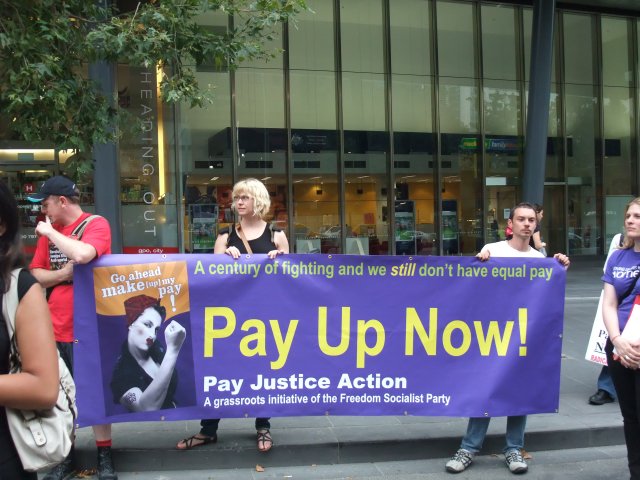
The article below is based on a speech by veteran feminist activist Eva Cox to the March 12 Sydney International Women’s Day protest.
* * *
I wore my 1973 T-shirt to the march today to remind myself of what we were hoping to do. It was printed by Canberra Women’s Liberation for the women who were short-listed for the first ever Prime Ministerial Women’s Adviser’s job with Gough Whitlam.
It has the clenched fist women’s symbol on the front and the word superwoman on the back.
Superwoman was the tag the media gave us to criticise the appointment, the fist was to remind us of our role in radical change. And there is still much to do.
The next 100 years starts from now, with us! And what we still have to do will be more difficult than what we have already done.
We did the more obvious bits: the law reform that stopped open discrimination against women, the funding of services for women run by women, the right to make most choices about our fertility and the acknowledgement that violence against women was to be taken seriously.
Now comes the hard stuff: changing attitudes, culture and the power games.
We need to do this, not just to advance women but society in general because current beliefs are damaging our social fabric.
Locally, nationally and beyond — politics and policy reflect narrow dysfunctional versions of masculinity.
The most serious barrier to big changes is the way major politicians and parties assume we live in an economy and not a society. This means the needs of society are not on the agenda. This unbalanced approach is one of the big issues we need to tackle.
The market model that arrived in the ’80s stuffed up the changes we fought for in the ’70s.
These last decades have created more macho workplaces, longer working hours and cultures of politics that ignored or trashed the “soft” areas of life: that is, those associated with women.
Community needs, care, social issues, relationships, sexuality, disabilities, culture and feelings were ignored or put into money equations.
And this was all disguised by selling people, including women, the idea that they had choices and if things went wrong it was their fault.
This change smothered much of the radical changes that we foreshadowed in the ’70s when we talked about women’s liberation.
This was freedom from gendered assumptions about what women could do and should do. It was not just about being equal on male terms.
We saw futures where social rewards and responsibilities were fair. We wanted to live in communities and nations that respect and value the diverse ways people connect, care and relate.
We wanted a good society to be funded by fair economic means, but none of that has occurred.
Take equal pay, the theme for today. A case now underway will hopefully move us on. But is it enough? Let’s look at what has happened so far.

In 1972, the new Whitlam government reopened the national wage case, under pressure from the women’s movement, and we had the first clear statement about equal pay for the same jobs.
But by the ’80s the changes stalled and the gap has sat somewhere around 18% ever since. Why?
Part of the problem came from a belief the gap was closing, as well as prejudices that affected deciding what was work of equal value. Basically, the problem came down to deeply gendered judgements by those in power.
The jobs mainly done by women still are seen as less skilled and valuable than jobs mostly done by men.
It is not the content of the job, the levels of skills or the value of the job to the community that is counted, but whether it was done mostly or only by women.
The current equal pay case covers some feminised areas of care work covered in limited awards, and will, we hope, create an important precedent.
However, there are many other gender anomalies in pay, even within industries.
Why do human resource executives get paid less than financial executives? The answer is gender!
The argument for these differences is that the market determines their pay. But who runs this market? Not us. So that is why we need big changes not small change.
Economic models don’t work well and create inequality and unfairness. The global financial crisis shows the market model’s serious flaws and it is time we pushed social issues back on the agenda.
This means changing public and political attitudes and the ways that our social and political lives are defined and controlled.
Feminists need to act: to put up new ideas, devise new policies and do much more than just criticise the status quo.
We need to counter the current biases in the way paid and unpaid work is valued.
We need to look at how we allocate our time to different types of work and sort out new ways of combining the responsibilities and pleasures of caring, parenting, community and paid jobs.
We need to devise ways of valuing what we do in ways that are not predetermined by gender or related characteristics.
We need to offer leadership, and work out why this concept is often a scary word for too many women.
We need to lead on our terms and not be coopted into being good, nice women in the current structures. Nice women don’t make changes.
We can’t just rely on having more women in top positions to make the changes, because too many get there because they are not seen as a threat to the status quo.
We need ideas, spaces to talk, and online contacts to explore ideas and put up alternatives to what is on offer. So think about what you can do, what you will contribute to create the big changes we still need.
Over to you.